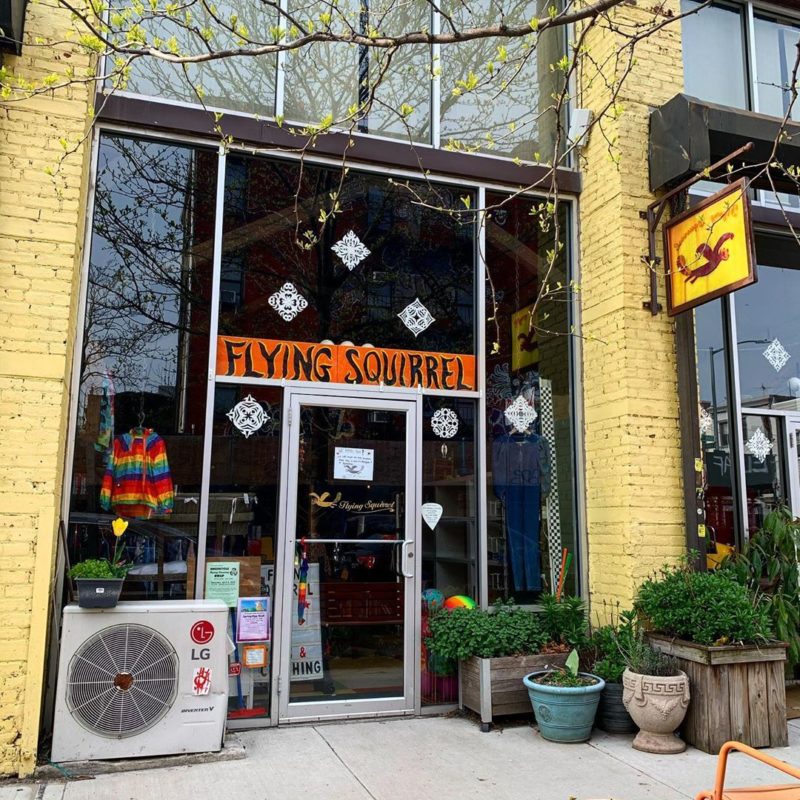Pandemic Was The Final Straw: Greenpoint Store Flying Squirrel Closes Its Doors After 17 Years


Kate Schmitz, an artist and the owner of Greenpoint’s Flying Squirrel, was hopeful to be finally, after 17 years, turning a profit. Then, the pandemic hit, and her store — which sells new and secondhand children’s toys and clothing — was ordered closed. On Monday she received a notice to vacate the storefront by May 2nd.
Flying Squirrel was struggling – even with the $2,000 Disaster Relief Fund loan and $10,000 PPP (Payment Protection Program) loan she received.
“I put my entire life savings into this store three years ago,” Schmitz said. She took the store over from her business partner, with whom she started the business, but now she’s walking away with debt – and uncertain job prospects. “I have no job,” Schmitz said. “And I’m 52! I’m not the most hirable age.”
Schmitz has not been able to pay the $6,200 monthly rent since March 1st – an amount she was only able to afford by bringing in subtenants, small business owners who rented out sections of the shop.
Schmitz said that her landlord – Pearl Realty Management – sent her a personal guarantee letter to sign on March 18th, saying that she’d be personally responsible for the rent due on the storefront. Schmitz ignored it.
“Even before I found a lawyer, I was smart enough to know that I should not sign that,” Schmitz said. And because she didn’t sign it, “they just continued to send me escalated, harassing messages telling me how much I owed.”
Eventually, she received the eviction notice, telling her she’d need to be out in five days – even though, she said, she was only two months behind on rent, having been at the same location for 17 years.
In an executive order issued on March 20th, Governor Cuomo had placed a moratorium on all evictions of both residential and commercial tenants until June 20th. We reached out to Pearl Realty Management for a statement a number of times, but are yet to hear back.
Schmitz has every intention of bringing the store back someday – though it may not be in Greenpoint. “Either I have to move to Ridgewood or I have to have a much, much, much smaller store,” she said.
Flying Squirrel was more than a store: it was a representation of everything Schmitz liked, and the things she was proud to sell to her friends and neighbors. “It was a kids store, but I just got things that I liked. I just happened to like things for kids,” Schmitz said. “It was a very curated collection of what I would want, whether it was new or secondhand, for myself, or for someone I knew, or for my kids.”

Schmitz will keep as much merchandise as she can in storage, waiting for the day she can finally reopen, but she’s also parting ways with a great deal of it. A woman who runs a nursery school will come and pick up some of the secondhand toys; Schmitz has also found places to donate the books, clothes, and athletic cleats. And whatever she can’t donate, she’ll put out front for anyone to take, stacked high in the towering bookshelves that once lined the walls of Flying Squirrel. “I’m not going to ever go look and see what’s taken and what’s not,” Schmitz said. “There’s so much stuff.”
Flying Squirrel is not alone in trying and failing to negotiate a way to stay in business, despite the moratorium on evictions in place.
Another commercial tenant of Pearl Realty Management in Greenpoint, who has asked to remain anonymous, had reached out to the company in late March to say he would not be able to afford rent — he had closed his store down on March 10th, before the governor issued the official mandate to do so. “I didn’t feel comfortable about making my employees come in, and I figured it was going to be mandatory soon anyway.”
The landlord refused to discount his rent, and instead offered to defer it for a couple of months – but only if he agreed to sign the same letter they sent Schmitz, promising that he would continue to pay rent as long as he occupied the space. “Right now, I’m uncomfortable with that, because I don’t know how long I’ll be closed,” the tenant said. Instead, he offered to pay a third of the rent, which Pearl Realty Management refused, saying they could only offer to defer.
The tenant also mentioned that the company was “flexible about reimbursement,” which, he thinks, may mean that they’ll back off on rent by the end of the year.
We reached out to Small Business Services (SBS) to ask what resources are available to these kinds of small businesses facing landlord issues due to the coronavirus. Samantha Keitt, Press Secretary for SBS, said the city helps small businesses get a free lawyer to help negotiate rent-related issues.
“We are connecting business owners who are facing challenges related to their lease or rent agreements to pro bono attorneys to help them negotiate with their landlords during this time. We have also launched a series of technical assistance webinars,” Keitt added, “to provide information on financial assistance through SBA and other private, philanthropic, and non-profit organizations, tax, debt, and utilities relief, marketing support, regulatory changes and employee support. We are working around the clock to get these entrepreneurs the help they desperately need.”
Small businesses struggling from the impact of COVID-19 can also pursue pro bono legal consultation through the City Bar Justice Center’s (CBJC) COVID-19 Small Business Remote Legal Clinic (the CV-19 Clinic).




